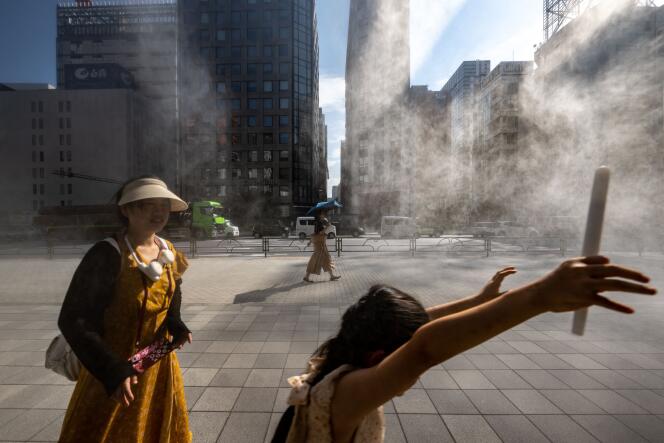


As has been the routine throughout this summer, on Tuesday, September 5, residents of Japan once again received a heat alert on their mobile phones, warning them to "avoid strenuous sports activities" and to "watch out for heat stroke." This type of message is hardly unusual in a country familiar with grueling summer humidity. But, as in the rest of the world, the summer of 2023 looks set to be a record-breaking season for the Archipelago, with abnormally high temperatures against a backdrop of relative governmental sluggishness on climate action.
On September 1, the Japanese Meteorological Agency drew a disturbing picture of the summer, characterized by "temperatures considerably above" seasonal norms. The average for 2023 was 1.76°C above normal. Never before has the gap been so wide. The previous record of 1.08°C was set in 2010.
According to the Japan Meteorological Agency, Tokyo experienced an unprecedented fifty-nine consecutive days above 30°C, with the streak still running as of September 5. Elsewhere in Japan, the towns of Komatsu (Ishikawa Prefecture, central Japan) and Date (Fukushima Prefecture, northeast Japan) recorded 40°C for the first time. Toyooka endured twenty-two days at 35°C, a record for this city in Hyogo prefecture (West). Sea surface temperatures around Japan are also one degree above average. It has never been this warm since records began in 1982.
This heat has health consequences. In July, almost 50,000 people were hospitalized for heatstroke, and fifty-three died. These record temperatures have also been accompanied by a shortage of rainfall, which is having an impact on water supplies. Just 90 millimeters of rain fell in July in the upper reaches of the River Tone, a far cry from the usual 230 millimeters. "The level of the river's nine dams, which concentrate most of the water reserves for Tokyo and the surrounding region, was at 67% of capacity on August 24, compared with an average of 80%," explained Muto Kenji of the Ministry of Territories. "A 10% restriction on water consumption could be imposed if reserves fell below 50%." Such a measure had already been taken in 2016.
On August 18, Tokyo Governor Koike Yuriko called on the population to reduce their water consumption. "There is a difficult situation emerging in some places. I ask for everyone's cooperation in saving water," she explained.
The lack of rainfall is also affecting crops. In Niigata prefecture (North), cucumber crops were less than half their usual yields. Prices have risen by 20-30% and crop losses of peppers and cabbage were recorded on 600 hectares of land. The situation could improve in September, as the Japanese Meteorological Agency is forecasting average levels of rainfall. Temperatures, however, are expected to remain above average.
You have 34.42% of this article left to read. The rest is for subscribers only.
